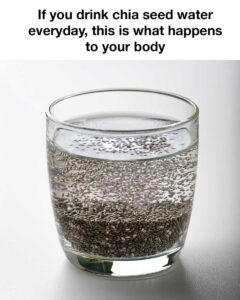
Chia seeds, the small black seeds from the Salvia hispanica plant, have recently gained popularity as a nutritional powerhouse. Known for being packed with nutrients, these tiny seeds offer an array of health benefits, particularly when consumed in chia seed water. This simple drink involves soaking chia seeds in water until they form a gel-like consistency, making it easy to incorporate into your daily routine. Let’s dive into the potential benefits of adding chia seed water to your day-to-day life and see how it can positively impact your health.
What Makes Chia Seeds So Nutritious?
Chia seeds are loaded with essential nutrients, including omega-3 fatty acids, fiber, protein, and several vitamins and minerals. An ounce (about 28 grams) of chia seeds contains around 137 calories, 11 grams of fiber, 4 grams of protein, and 9 grams of fat, of which 5 grams are omega-3 fatty acids. They’re also rich in antioxidants, calcium, magnesium, iron, and zinc, giving them a solid nutritional profile that supports various health benefits.
Health Benefits of Daily Chia Seed Water Consumption
Making chia seed water a daily habit can bring multiple benefits, from improved digestion and hydration to better weight control and increased energy. The fiber helps with digestion, while the omega-3s support heart health. The gel consistency that chia seeds develop when soaked keeps you feeling full longer, aiding in appetite control and potential weight loss.
- Supports Digestive Health With nearly 11 grams of fiber per ounce, chia seeds are a great source of dietary fiber, primarily soluble fiber that absorbs water to create a gel-like substance. This helps slow down digestion, making you feel full longer and stabilizing blood sugar levels. Fiber also promotes regular bowel movements, which helps alleviate constipation and maintains gut health.
- Enhances Hydration and Electrolyte Balance Chia seeds can absorb up to 12 times their weight in water, creating a gel that retains moisture in your system, leading to longer-lasting hydration. Additionally, they provide essential electrolytes like calcium, magnesium, and potassium, which help maintain an optimal balance for hydration and physical function.










